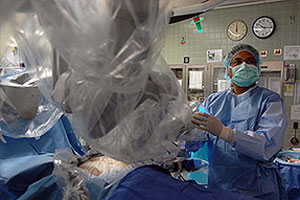Chicago in the News
The Chronicle’s biweekly column Chicago In the News offers a digest of commentary and quotations by a few of the University faculty members, students and alumni who have been headlining the news in recent weeks. Chicago faculty members are some of the most frequently quoted experts, so space allows publishing references to only selected examples. To read many of the full newspaper articles mentioned in this column, visit the In the News column at the University News Office Web site: http://www-news.uchicago.edu.
Library design draws attention
The University’s proposed glass-domed, partly underground library garnered much media attention, beginning with the Chicago Tribune on Monday, May 12. The unique design, by Chicago architect Helmut Jahn, will allow for 3.5 million volumes and allow the University to keep its entire collection on campus. “The hesitation is: ‘Where is my large, drab rectangular box to have books stored in?’ This is very different, but it will still do what the box was going to do,” said James Crown, Chairman of the University Board of Trustees. Expected to open in 2010, it will be named for University alumni Joe and Rika Mansueto, who gave a $25 million gift to support construction of the new library. Joe Mansueto is chairman and CEO of Morningstar, Inc. The Chronicle of Higher Education and CBS-2 Chicago, among others, also reported on the story.
Hoops job a dream for grad
A University graduate has put his love of numbers to work for his hometown team, wrote Steven Levitt, the Alvin Baum Professor in Economics and the College, along with his Freakonomics co-author Stephen Dubner, in the Sunday, May 4 New York Times. Mike Zarren, a four-time University quiz-bowl champion and Levitt’s former economics student, crunches stats for the NBA’s Boston Celtics and also produces video tagged with statistical information. Zarren also serves as the team’s associate counsel. “Most geeks are not basketball guys, and most basketball guys are not geeks,” said Zarren, a Boston native whose family has held Celtics season tickets since 1974. “You have to be both to be successful in this developing field.”
Olympics due for media blitz
John MacAloon, Associate Dean of the Division of Social Sciences, was quoted in a Tuesday, April 29 San Jose Mercury News article about the Beijing Olympics, which may be one of the most contentious Olympics since the 1980 boycott of the Soviet games. Pro-Tibet protestors have, in part, created an anti-Western backlash by angry Chinese. MacAloon said even if foreigners don’t protest at the games, many Chinese are likely to be offended by Western journalists. He said, “the Chinese are not prepared for the kind of press freedom that happens at every Olympics and produces insult and bad feelings. Everything that gets written will be instantly fed back to the students and the Internet community in Beijing.”
Debate gets early start
The scientific controversy surrounding universal prekindergarten and its effects on the upcoming presidential election was examined in the Sunday, April 27 Chicago Tribune. James Heckman, the Henry Schultz Distinguished Service Professor in Economics and the College, said reaching children before preschool maximizes the long-term economic return. “Even at age 4 or 5 you may be starting too late,” he said. “I wouldn’t say it’s hopeless to help kids after those early years, but it’s extremely expensive.” The article also cited a study by Peter Huttenlocher, Professor in Pediatrics and Neurology, which showed that over the last 30 years, connections between cells in most brain areas peak by age 3, then gradually decline over time.
Superstitious to a fault
A Tuesday, May 6 article in the New York Times reported new experimental evidence that showed just how superstitious people can be. Jane Risen, Assistant Professor in Behavioral Science in the Graduate School of Business, and Thomas Gilovich, professor in psychology at Cornell University, relied on a well-known superstition about lottery tickets in their study. Subjects would refuse to trade their ticket, despite being offered a cash bonus and reassured that the other ticket was just as likely to win. “It is an irony of the post-Enlightenment world that so many people who don’t believe in fate refuse to tempt it,” wrote the researchers. A theory dubbed “anticipated regret” claims that even though their odds were no different, subjects felt they would look stupid if they traded away a winner.
|
|
Pioneer in robotic bypass
USA Today detailed robotic open-heart surgery at the University Medical Center in a Tuesday, April 29 article. The bypass operation comes without a big incision or the long recovery time of traditional surgery. “Someday, we’ll look back and think, ‘My God, how brutal we were,’” said Valluvan Jeevanandam, Chief of Cardiac and Thoracic Surgery in the Medical Center. Called “da Vinci,” the technology also has been used in hysterectomy and prostate removal surgery. Doctors have been slow to adopt robotic bypass due to the procedure’s complexity, the lack of tech-savvy surgeons and a shallow pool of potential patients. There are 867 machines installed at hospitals internationally, at a cost of $1.5 million.
Furniture: To rot or not
The practicality of biodegradable furniture was debated in a Thursday, May 8 article in the New York Times. Sustainable, green furniture is increasingly being marketed by designers, as something fully compostable, like lawn clippings. But confusion surrounds products’ claims, as well as their viability in today’s increasingly disposable world. It marks a change from the days of when heirlooms were passed through generations. “Their longevity, in the past, has always been part of the thing that gives them value,” said Bill Brown, Chairman of English Language & Literature and the Edward Carson Waller Distinguished Service Professor.
![[Chronicle]](/images/sidebar_header_oct06.gif)
